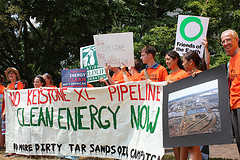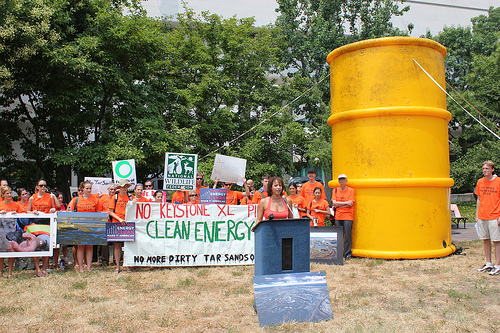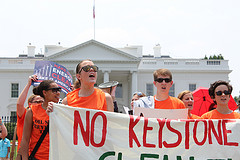Yesterday marked the 80th day that oil has been hemorrhaging into the Gulf of Mexico from the site where BP's Deepwater Horizon rig exploded and took the lives of 11 workers. If our country learns one lesson from this tragedy, I hope it's this: that we can't afford to maintain our profligate diet of dirty, dangerous oil, no matter how much greedy oil corporations scheme to keep us hooked.
One of the most devastating projects Big Oil has cooked up in North America, and arguably worldwide, is the exploitation of Canada's tar sands for crude.
To access oil from the tar sands, giants like BP are clear-cutting massive swaths of forest, draining wetlands and hauling away tons of living matter and soil to mine a tarry substance that can be upgraded and refined into oil. Indigenous communities living downstream are being poisoned by toxins leaching from the sludge left behind. In Fort Chipewyan, one hundred of the town's 1,200 residents have died from rare cancers and auto-immune diseases since 2000.
Tar sands oil is called the world's dirtiest because its production dumps three times more climate-warming emissions into the atmosphere than conventional oil. It also spews higher levels of smog- and asthma-causing toxins into the air when refined.
This is not simply Canada's problem -- Big Oil's big hope for profiting from the tar sands is cementing our country's growing addiction to oil imported from them.
 Yesterday was not just the 80th day of the oil catastrophe in the Gulf, it was also a nationwide day of action condemning a proposed pipeline that would make Big Oil's hope a reality by pumping 900,000 barrels of toxic tar sands oil each day from Canada to refineries on the Gulf Coast of Texas. Called the Keystone XL, this pipeline would stretch 1,700 miles, putting farmland, rivers, and drinking water sources in Midwest and Great Plains states at risk of spills and exacerbating air pollution in communities surrounding the Texas refineries where it would terminate.
Yesterday was not just the 80th day of the oil catastrophe in the Gulf, it was also a nationwide day of action condemning a proposed pipeline that would make Big Oil's hope a reality by pumping 900,000 barrels of toxic tar sands oil each day from Canada to refineries on the Gulf Coast of Texas. Called the Keystone XL, this pipeline would stretch 1,700 miles, putting farmland, rivers, and drinking water sources in Midwest and Great Plains states at risk of spills and exacerbating air pollution in communities surrounding the Texas refineries where it would terminate.
Clean energy and public health advocates, indigenous activists, and landowners whose property is in the pipeline's path united to protest the project outside the Canadian embassy and White House in Washington, D.C., at Canadian consulates in Boston, Detroit, New York and Seattle and in three of the states that the pipeline would cross -- South Dakota, Nebraska and Texas.
At the Washington, D.C. event, where I was one of the speakers addressing the crowd and members of the press, our message was clear and simple: We want clean energy now, not more dirty oil. Actress and National Wildlife Federation board member Gloria Reuben, another speaker, called on President Obama to follow through on his pledge to move us forward to the clean energy future.

 About 50 committed citizens marched through suffocating temperatures to take this message directly to the White House because ultimately, President Obama has the final say as to whether the Keystone XL pipeline is built. Currently, the State Department is crafting a formal determination of whether the pipeline is in the "national interest." Then this fall, the president will make a decision: to get serious about leading our country to safe, clean alternatives to oil or to keep us latched to oil and put people's health and ecosystems in danger.
About 50 committed citizens marched through suffocating temperatures to take this message directly to the White House because ultimately, President Obama has the final say as to whether the Keystone XL pipeline is built. Currently, the State Department is crafting a formal determination of whether the pipeline is in the "national interest." Then this fall, the president will make a decision: to get serious about leading our country to safe, clean alternatives to oil or to keep us latched to oil and put people's health and ecosystems in danger.
The day of action that took place yesterday, and which included not just public events and press conferences, but also meetings with Obama administration officials and members of Congress, is just one sign of the growing movement to stop this pipeline.
More than 100,000 citizens, including more than 40,000 Friends of the Earth members and activists, sent messages to the Obama administration urging that this pipeline be stopped during a public comment period that ended July 2.
That same day, Congressman Henry Waxman, chair of the House Energy and Commerce Committee, sent a strongly worded letter to Secretary of State Hillary Clinton excoriating the pipeline as "a multibillion-dollar investment to expand our reliance on the dirtiest source of transportation fuel currently available." Congressman Waxman's letter came on the heels of a letter that 50 members of Congress jointly sent to Secretary Clinton urging that her agency take the environmental and public health concerns being raised seriously.
I invite and encourage you to join our campaign to stop this pipeline and make sure President Obama keeps his focus on leading us to an oil-free future. Click here to send a message urging President Obama to take the side of the public and clean energy -- not Big Oil -- by rejecting this pipeline.
